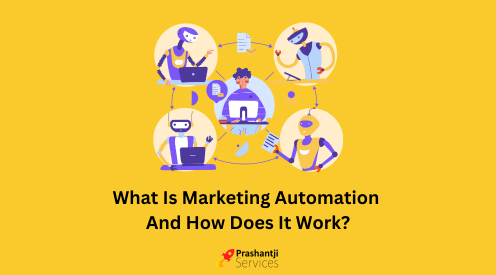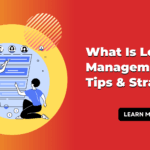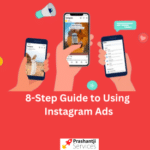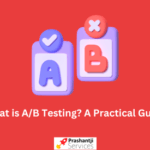What Is Marketing Automation And How Does It Work?
In the realm of modern marketing, a revolutionary force is quietly reshaping the landscape—marketing automation. You might have heard the term thrown around, but what exactly is it, and how can it elevate your business game?
Prepare to have the mysteries unraveled as we take you on a journey through the world of marketing automation: from its definition to its real-world impact.
Understanding the Magic of Marketing Automation
Imagine a world where your marketing campaigns hit the bullseye every time, your team’s efficiency soars, and your customers enjoy an unmatched experience. This isn’t a dream—it’s the reality that marketing automation brings to the table.
As the marketing landscape evolves, one thing becomes clear: the power of marketing automation. Over the last decade, it has gained immense popularity, and it’s not hard to see why.
In a world where marketers are juggling multiple channels and platforms to engage customers, marketing automation swoops in as a superhero, saving time and effort. It’s the tool that takes care of routine tasks, freeing up marketers to focus on strategic endeavors.
Decoding the Essence of Marketing Automation
At its heart, marketing automation encompasses an array of software and tools designed to manage marketing tasks, processes, and workflows with minimal human intervention.
This isn’t just about lightening the load for marketers—it’s about boosting productivity and efficiency across an entire organization, leading to better outcomes for your business.
Marketing automation is the key to:
- Speeding Things Up: Streamlining marketing processes and saving valuable time.
- Boosting Productivity: Enhancing both individual and team performance.
- Nurturing Leads: Building and nurturing relationships with potential customers.
- Enhancing Experience: Elevating customer satisfaction and loyalty.
- Saving Costs: Reducing operational expenses.
From simplifying email marketing campaigns to segmenting potential customers, marketing automation is a game-changer that streamlines business processes and enhances customer experiences.
Distinguishing Marketing Automation from CRM
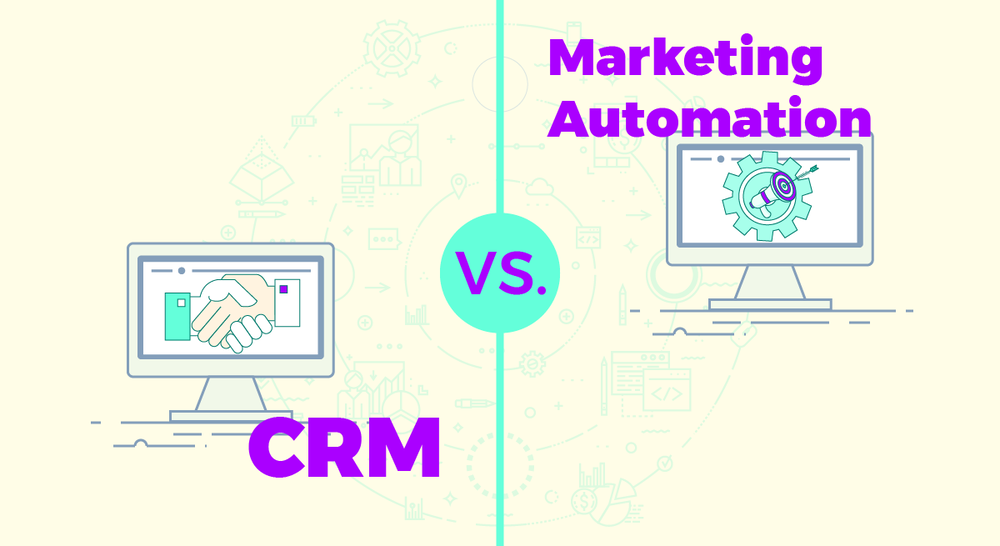
Although marketing automation and Customer Relationship Management (CRM) software are closely related, they serve distinct purposes. Think of them as two sides of the same coin, working in harmony to supercharge your customer journey.
While marketing automation focuses on automating and optimizing marketing tasks, CRM software is the ultimate companion for your sales and customer service teams.
CRM stores vital customer data, from purchase history to interactions. It’s the hub for overseeing customer relationships throughout the sales funnel.
The Marvels Marketing Automation Unleashes
Marketing automation is the conductor of a symphony that fine-tunes marketing strategies, orchestrates campaigns, and propels lead generation through automated workflows.
Picture delivering a tailored customer experience without the manual effort. Marketing automation does just that by harnessing data to deliver personalized content at the right moment. This symphony unfolds by guiding the automation tool on data collection and utilization.
Marketing automation’s capabilities include:
- Elevating Email Marketing: Automating email campaigns that send personalized messages based on user actions. For instance, if a potential customer adds an item to their cart and leaves, a well-timed email could remind them of their forgotten item.
- Optimizing Campaigns: Tailoring messages to leads based on their stage in the customer journey and the platform you’re engaging them on, whether it’s social media, email, or elsewhere.
- Deepening Insights: Unveiling the performance of your marketing campaigns and how well you’re engaging and converting leads.
Lifting the Veil: How Marketing Automation Works
So, how does marketing automation pull off this magic trick?
Each interaction you have with customers or leads generates data—valuable currency in the marketing world. Marketing automation doesn’t hoard this treasure; it analyzes and employs it intelligently.
Here’s a glimpse into marketing automation’s operation:
- Segmentation Strategy: Grouping leads based on specific criteria, such as behavior or interests.
- Workflow Creation: Designing campaigns that automatically deliver tailored messages triggered by events, actions, or stages in the customer journey.
- Customization Control: Crafting workflows from templates or from scratch to suit your unique needs.
Once these workflows are set up, your marketing automation software takes the stage, leaving you to enjoy the performance. Regularly checking analytics and reports ensures your symphony hits all the right notes.
Exploring the Ensemble: Marketing Automation Platforms
The stage of marketing automation hosts a cast of diverse platforms, each with its unique role and set of functionalities. Let’s shine the spotlight on a few:
- ActiveCampaign: This versatile virtuoso pulls data from various channels, including social media and live chat. Its repertoire includes advanced reporting and customizable sign-up forms.
- Klaviyo: An automation maestro, delivering personalized messages based on behavior and advanced segmentation.
- Customer.io: Orchestrating messaging across email, push notifications, and SMS, it creates a seamless customer experience.
A Glimpse of Harmony: Examples of Marketing Automation
As we continue to unveil marketing automation’s secrets, let’s explore a few real-life scenarios:
- Reminders and Re-Engagement: A skincare brand triggers an email three months after purchase, inviting customers to replenish their product.
- Feedback Serenades: Post-webinar, an automated email with a survey seeks attendees’ input, enriching insights.
- Offer Overture: Upon signing up for a loyalty program, a new customer receives an SMS offering a generous discount.
- Onboarding Symphony: A service sends a helpful email a few days after sign-up, guiding new users on making the most of their experience.
Revealing the Potential: Embrace the Magic of Marketing Automation
In a world where time is gold, marketing automation is the treasure map guiding you to untold riches. It’s more than just a tool—it’s the compass that directs your marketing efforts toward success.
By harnessing its power, you’re not only optimizing your strategies but also gaining the gift of time. As the applause for marketing automation grows louder, it’s time to step into the spotlight and seize the opportunities it offers.
Strategies for Seamlessness: Mastering Marketing Automation
- Now that you’re familiar with the symphony of marketing automation, let’s delve into strategies for mastering this art:
- Define Clear Objectives: Outline your goals and objectives for each marketing campaign. Are you aiming to boost lead generation, enhance customer engagement, or increase conversions? Setting clear objectives lays the foundation for effective automation.
- Segment with Precision: Like a skilled conductor, segment your audience based on demographics, behaviors, or interests. This paves the way for tailored messaging that resonates.
- Craft Engaging Content: A captivating melody captures the heart, and in marketing, content is your melody. Create compelling content that aligns with each stage of the customer journey.
- Map Out Customer Journeys: Plot out the path you want your customers to take, from the first touchpoint to conversion and beyond. Identify potential touchpoints where automation can enhance the experience.
- Test and Refine: Just as a symphony requires rehearsals, your automation workflows need testing and fine-tuning. Continuously analyze the performance metrics and make adjustments for optimal results.
- Harmony in Action: Real-Life Marketing Automation Success Stories
Let’s take a glimpse into the real-world impact of marketing automation through a couple of success stories:
Personalized Email Journey: An e-commerce brand embraced marketing automation to create a personalized email journey for customers.
From abandoned cart reminders to post-purchase recommendations, the brand witnessed a substantial increase in conversions and customer retention.
Lead Nurturing Excellence: A B2B company implemented marketing automation to nurture leads through targeted content and nurturing emails. The result? A significant reduction in the sales cycle and an increase in qualified leads.
Conclusion: Your Overture to Success
In the grand symphony of marketing, automation takes center stage, transforming your efforts into a harmonious masterpiece. As you navigate the ever-evolving landscape of modern business, remember that marketing automation isn’t just a tool—it’s your ticket to streamlined processes, enhanced customer experiences, and soaring success. So, embrace the magic, fine-tune your strategies, and let marketing automation be the driving force that propels your business to new heights.
Frequently Asked Questions:
- Is marketing automation suitable for small businesses?
Absolutely. Marketing automation can benefit businesses of all sizes by streamlining processes, enhancing customer experiences, and optimizing resource allocation. - How can marketing automation improve customer retention?
Marketing automation allows businesses to engage customers with personalized content at the right time, fostering a stronger connection and encouraging repeat business. - Are there any potential challenges with marketing automation?
Data privacy and security concerns can arise when handling customer data. It’s crucial to ensure compliance with regulations and prioritize data protection. - Can marketing automation replace human creativity?
While marketing automation can handle repetitive tasks, human creativity is irreplaceable when it comes to devising unique strategies, content, and campaigns. - What skills are necessary to implement marketing automation effectively?
A basic understanding of digital marketing, customer segmentation, and familiarity with automation tools are essential for successful implementation.


